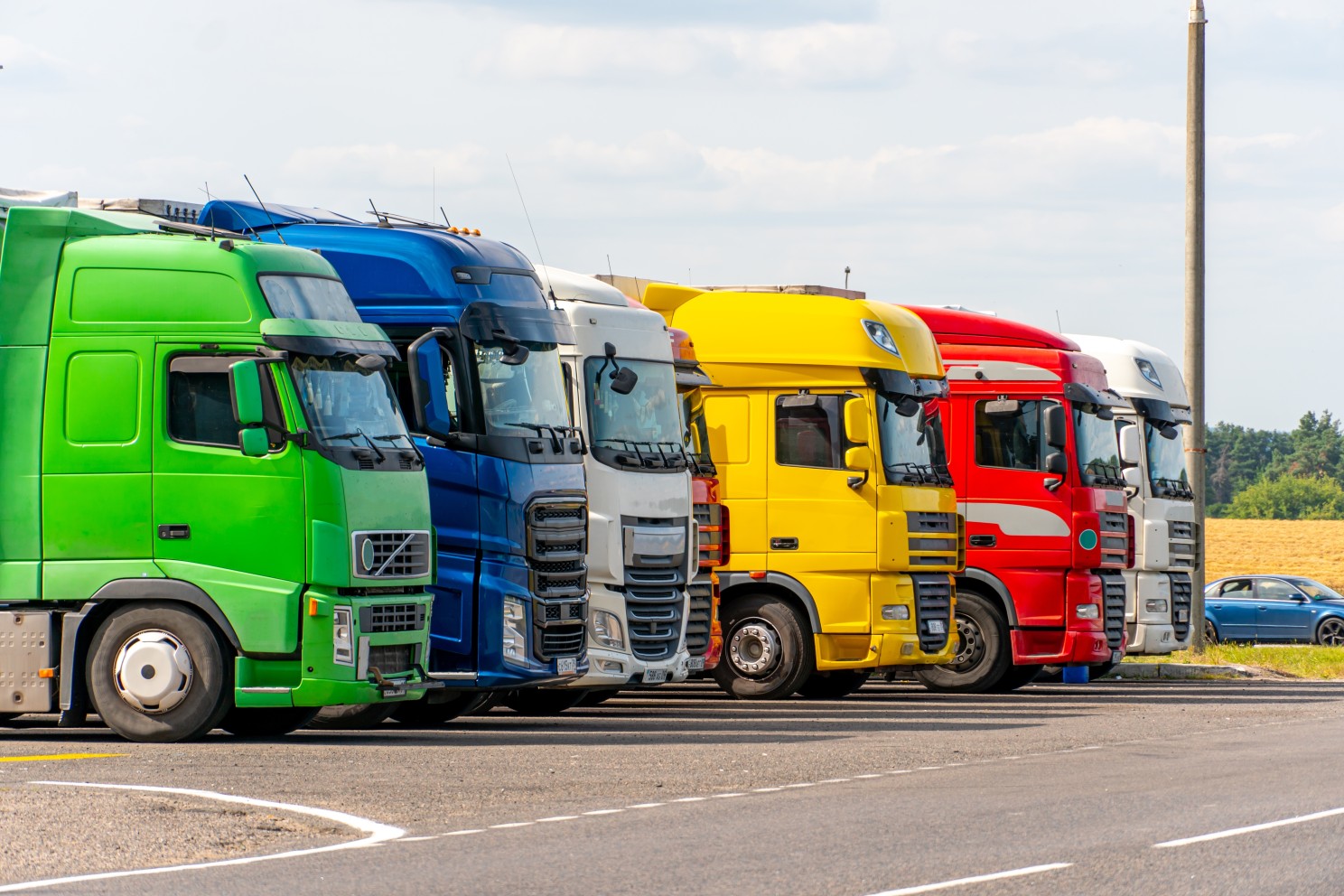
Susie Jones
Trucker-Geschichten: Geschichten von der offenen Straße
Erstellt: 22.08.2024
•
Aktualisiert: 22.08.2024
Wir wollen die Lkw-Gemeinschaft beleuchten und die Menschen hinter dem Lenkrad kennen lernen.
Von Hubschraubern, die vor ihren Lastwagen landen, bis hin zu Autos, die auf der falschen Seite der Autobahn fahren - erfahren Sie mehr über die Fahrer, die Ihre Waren ausliefern.
Alan
Alan ist seit 23 Jahren Fahrer und entschied sich für die Branche, nachdem er Ally Thomsons Trucker-Songs gehört hatte. Auf die Frage, was er am meisten an seinem Beruf liebt, antwortet er: "Die Einsamkeit, die das Lkw-Fahren mit sich bringt - man ist komplett vom Privatleben getrennt."
Volvo-Lkw sind sein Favorit, da er quer durch Großbritannien reist, um Waren von Amazon zu transportieren. Er sagt, er habe schon viele interessante Produkte transportiert, "die Auswahl ist grenzenlos - man denke nur an alles, was Amazon verkauft".
Für Fahrer, die über Nacht parken, ist es schwierig, sich während der Ausfallzeit zu unterhalten. Erfahrene Fahrer wie Alan haben ihre Abendroutine jedoch perfekt im Griff. Er sagt, dass er "gerne Sky TV auf dem iPad schaut", wenn er für die Nacht geparkt hat.
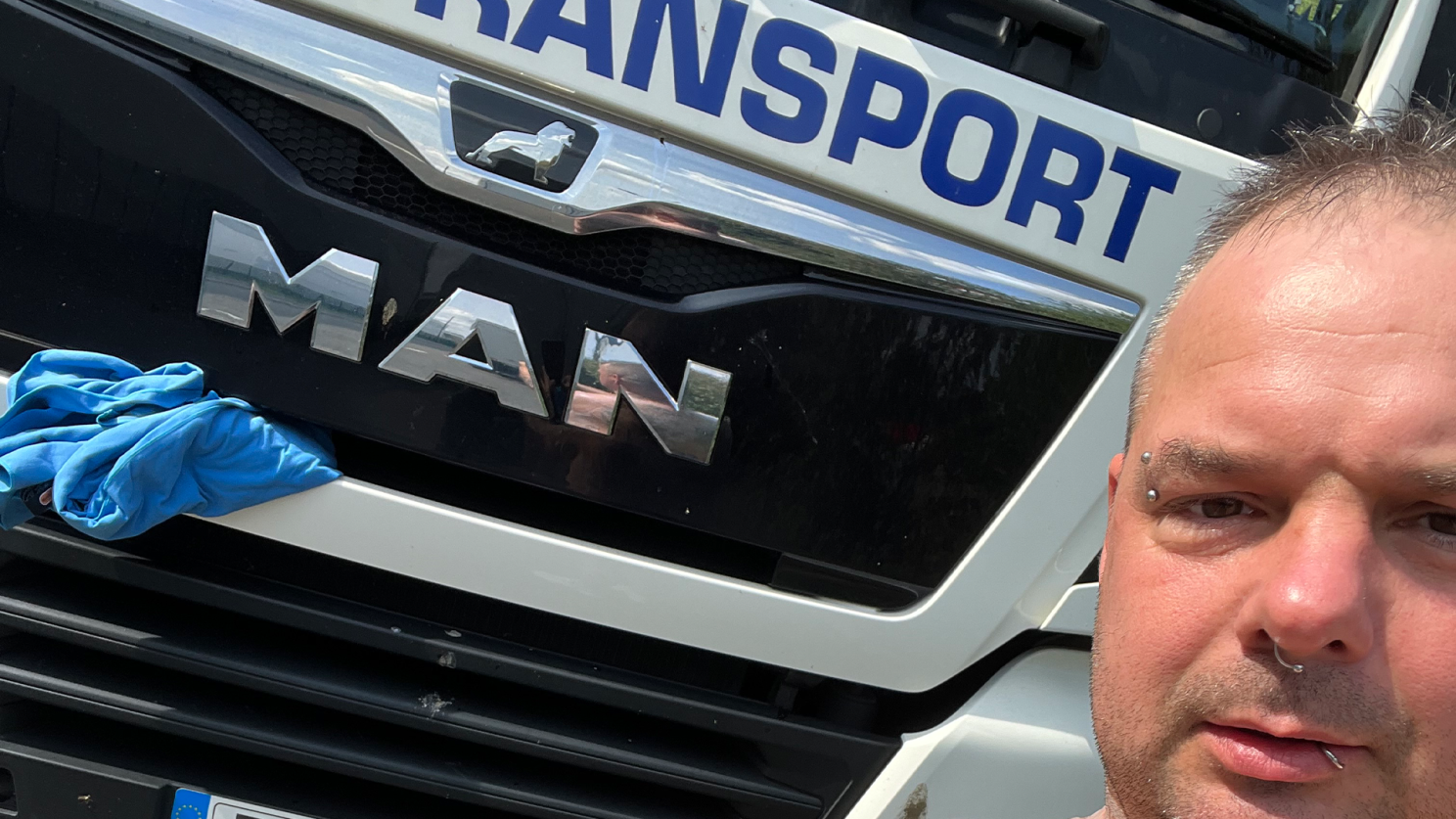
Für Autofahrer, denen es schwerfällt, sich am Steuer zu unterhalten, haben wir eine Liste von Möglichkeiten zusammengestellt, wie man Langeweile vermeiden kann.
Während die langen Stunden auf der Straße für viele eintönig erscheinen mögen, erklärt Alan, dass es immer etwas gibt, das ihn auf Trab hält.
"Ich glaube, das Verrückteste, was ich beim Fahren gesehen habe, war ein Hubschrauber, der direkt vor mir gelandet ist", erklärt er - weit entfernt von dem eintönigen Ruf, der die Branche seit Jahrzehnten umgibt.
Alan ist seit 23 Jahren in der Branche tätig und hat einige Ratschläge parat, die dafür sorgen werden, dass Ihre Zähne auf Reisen frisch aussehen.
Er erklärt: "Der Rat, den ich jedem geben würde, der neu in der Branche ist, ist, immer daran zu denken, seine Zahnbürste aufzuladen."
Richard
Vor 36 Jahren begann Richard seine Karriere in der Speditionsbranche und hat nie zurückgeblickt. Als er sich mit seinen beiden älteren Brüdern zusammentat, um bei der Auslieferung von Gütern im Vereinigten Königreich zu helfen, wurde er vom Fahrfieber gepackt.
"Ich liebe es, eine Ladung zu bekommen und loszufahren. Ich kann selbst entscheiden, wann ich eine Pause mache und wo ich parke. Es ist großartig, auf der Straße zu sein und durch ganz Großbritannien zu reisen", erklärt er.
Im Laufe seiner Karriere hat ihn das Leben auf der Straße bis nach Mailand, Italien, geführt - eine aufreibende Reise selbst für die erfahrensten Fahrer. Auf die Frage, wie er sich auf seinen Reisen unterhält, antwortet er: "Ich höre gerne Musik und sehe mir in meiner Freizeit Filme an."
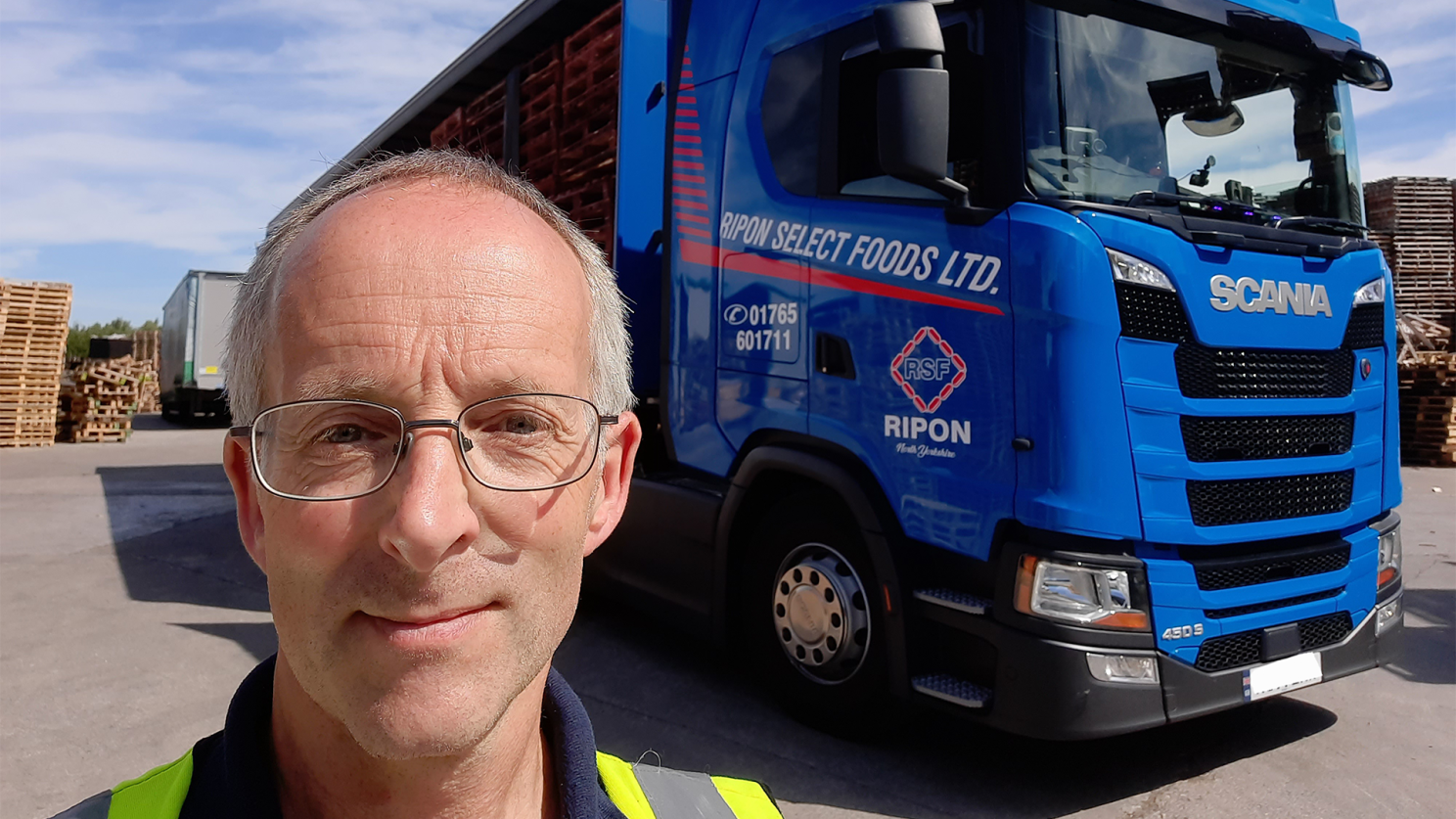
Der beste Lkw für diese Aufgabe? "Es muss ein Scania Next Generation 450S sein", sagt er.
In seinen 30 Jahren in der Branche hat Richard immer wieder verrückte Geschichten und ungewöhnliche Lieferungen erlebt: "Ich habe ein Auto gesehen, das auf der Autobahn in die falsche Richtung fuhr und von einer Ausfahrt kam. Das Interessanteste, was ich je hinten im Lkw hatte, war ein Umzugswagen vom St. Wilfred's Day.
Obwohl er die offene Straße immer noch liebt, sagt Richard, dass dies manchmal seinen Preis hat. Er bietet einen guten Einblick in die Realität dieses Berufs und gibt Ratschläge für diejenigen, die in der Branche arbeiten möchten.
"Überlegen Sie sich sehr genau, ob dies der richtige Beruf für Sie ist. Stellen Sie sich darauf ein, dass Sie lange arbeiten und viel vom Familienleben verpassen.
Sean
Da Sean in einer Familie von Fahrern aufwuchs, lag ihm das Lkw-Fahren im Blut, und vor 20 Jahren setzte er sich hinter das Steuer und schlug eine Karriere im Transportgewerbe ein.
Die Arbeit bringt viele Vorteile mit sich, aber am meisten liebt Sean die Freiheit, die ihm die Arbeit bietet. Diese Freiheit hat ihn für einen sechswöchigen Dienst sogar bis nach Schottland gebracht. Auf diesen langen Fahrten telefoniert er mit Freunden und sieht fern.
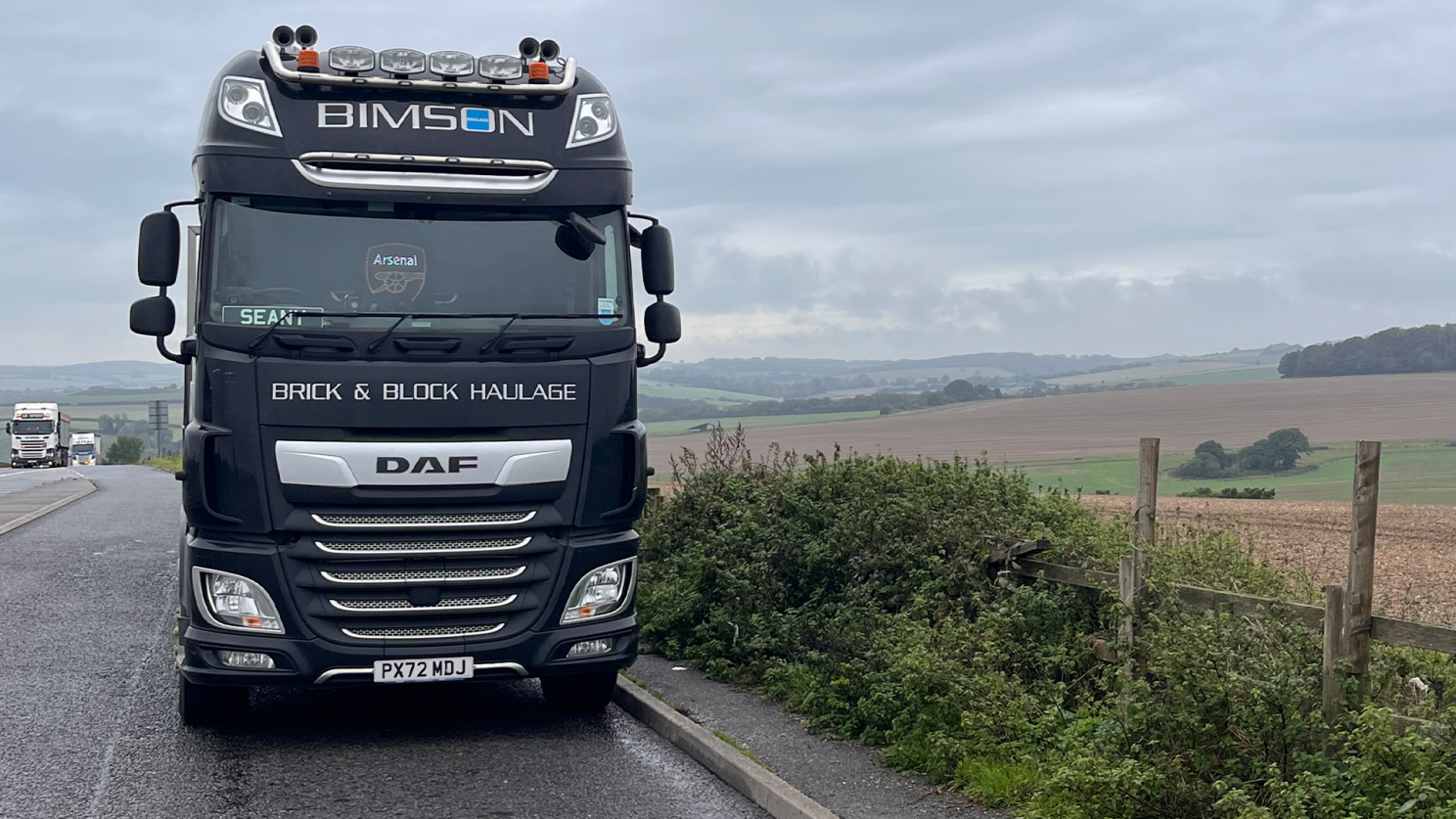
Darüber hinaus haben Truckstops für Sean eine wichtige Rolle gespielt, um die Isolation zu überwinden, die das Autofahren mit sich bringt. In den Truckstops herrscht oft reges Treiben, und Sean kann sich auf seinen Reisen mit Freunden treffen.
Diese Boxenstopps bieten die perfekte Gelegenheit, verrückte Geschichten von anderen Lkw-Fahrern zu hören. Ähnlich wie Richard war für Sean das Seltsamste, was er auf seinen Reisen gesehen hat, "ein Auto, das im Dunkeln in die falsche Richtung auf einer Autobahn fuhr" - eine Geschichte, die in der Lkw-Gemeinschaft nur allzu häufig vorkommt.
Ein DAF XF 530 ist Seans bevorzugter Lkw für den Transport von Baumaterialien im Vereinigten Königreich. Er rät jedem, der eine Karriere im Lkw-Verkehr anstrebt, "einfach loszulegen!"
Dave
Dave fährt seit 30 Jahren Lkw und ist schon bis nach Dänemark und Spanien gereist. Wenn er nicht gerade in seinem Lieblings-Lkw, einem Volvo FH, unterwegs ist, sieht er sich in seinem Fahrerhaus gerne Soaps an.
"Das Verhalten einiger Autofahrer hat mir einige verrückte Geschichten beschert", erklärt er. Als wir Dave jedoch nach dem Interessantesten fragten, das er je hinten in seinem LKW hatte, blieb er wortkarg - "das ist streng geheim", sagt er.
Nach 30 Jahren im Gütertransport hat Dave einige Dinge über die Welt des Transportwesens gelernt. Er gibt denjenigen, die ihre Karriere in der Branche starten wollen, einen guten Rat: "Spezialisieren Sie sich auf etwas".
Alastair
Alastair ist relativ neu in der Branche und hat sich für eine Karriere als Lkw-Fahrer entschieden, um sich nach seiner Pensionierung zu beschäftigen. Nach fünf Jahren genießt er vor allem die Vielfalt des Berufs.
In dieser Zeit hatte Alastair die Möglichkeit, durch das Vereinigte Königreich und Europa zu reisen: "Ich war in Inverness, Kopenhagen, Lissabon, Budapest und Rom", erzählt er.
Damit keine Langeweile aufkommt, hört Alastair gerne "Radio 4, LBC und 5 Live".
Auf seinen Reisen durch Europa hat er schon so manches ungewöhnliche Verhalten anderer Verkehrsteilnehmer erlebt. Aber es war näher an der Heimat, als er seinen Lkw durch "die Demonstrationen in London" manövrieren musste. Das war wahrscheinlich das Verrückteste, was ich je erlebt habe", erklärt er.
Für die 007-Fans erzählt Alastair von der Zeit, in der er einige streng geheime Gegenstände transportieren musste.
"Das Interessanteste, was ich bisher im Lkw hatte, waren wahrscheinlich James-Bond-Ausstellungsstücke", sagt er.
Obwohl Alastair noch nicht lange in dieser Branche tätig ist, hat er ein paar Worte für diejenigen, die neu in der Branche sind.
"Ein Rat, den ich jemandem geben würde, der darüber nachdenkt, in die Transportbranche einzusteigen, ist, ruhig zu bleiben.
Sean V
Seans Liebe zur Straße geht auf die vielen Sommerurlaube zurück, die er mit seinem Vater in dessen Lkw verbrachte. Nach 30 Jahren Fahrpraxis ist seine Liebe zum Autofahren immer noch ungebrochen.
"Was ich an meinem Job liebe, ist, all die schönen Orte im Vereinigten Königreich und in Europa zu sehen", erklärt er. Dieser Job hat ihn an verschiedene Orte geführt - Rom war die weiteste Reise, die er unternommen hat.
Wenn er nicht gerade die Städte erkundet, unterhält sich Sean gerne mit Fernsehen, seinem iPad und bis vor kurzem auch mit Spielen in seinem eigenen Taxi.
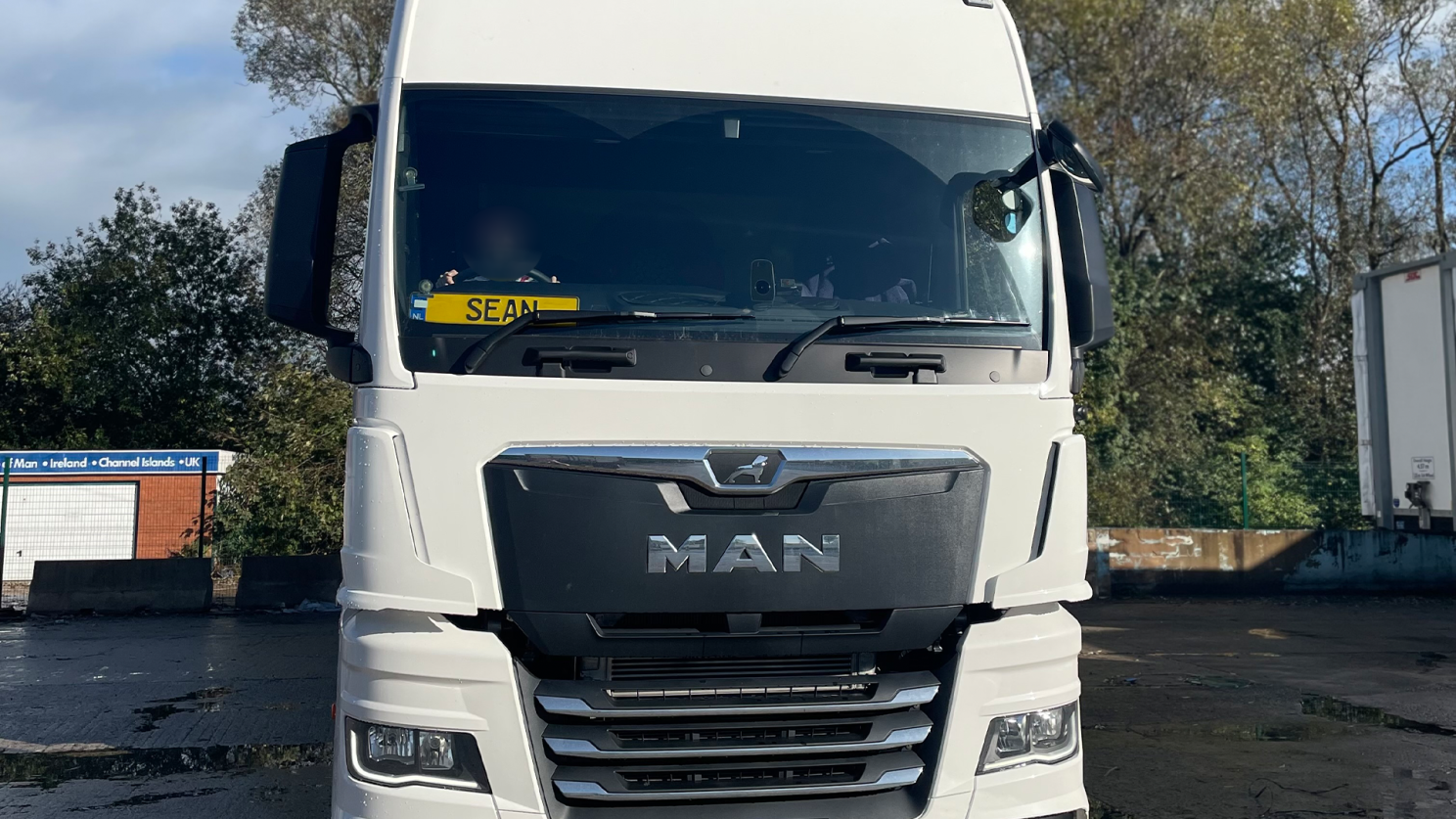
Das Verrückteste, was er auf der Straße erlebt hat?
Leider ist Sean ein weiterer Zeuge eines Anblicks, der unter Lkw-Fahrern nur allzu häufig vorkommt - "ein Auto, das auf der Autobahn in die falsche Richtung fährt", erklärt er.
In seiner 30-jährigen Laufbahn hat Sean festgestellt, dass er am liebsten DAF-Lkw fährt, und das Interessanteste, was er transportiert hat, war "medizinisches Spezialgerät".
Seans Liebe zur Branche überwiegt einige der negativen Aspekte des Berufs. Für diejenigen, die ihre Karriere im Transportgewerbe starten wollen, hat er jedoch folgende weise Worte parat:
"Wenn Sie in der Branche arbeiten wollen, müssen Sie sich auf lange Arbeitszeiten einstellen.
Melden Sie sich noch heute bei SNAP an
SNAP macht Ihnen das Leben leichter, indem es Sie mit unserem umfangreichen Netz von Straßentransportdiensten verbindet. Melden Sie sich noch heute an.


